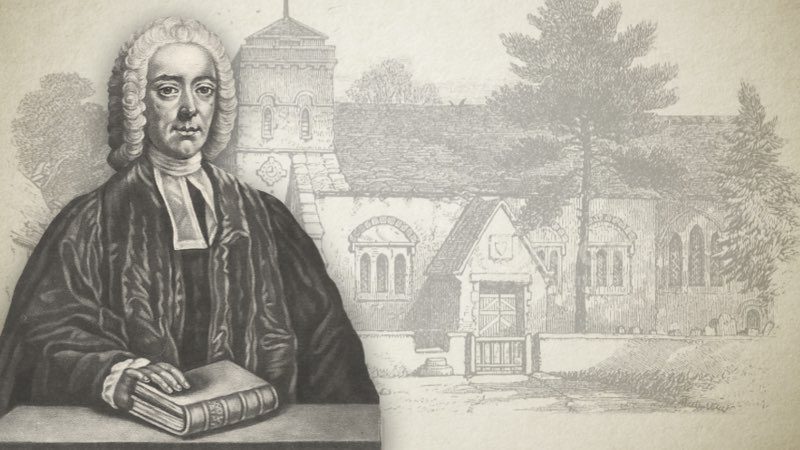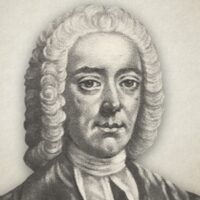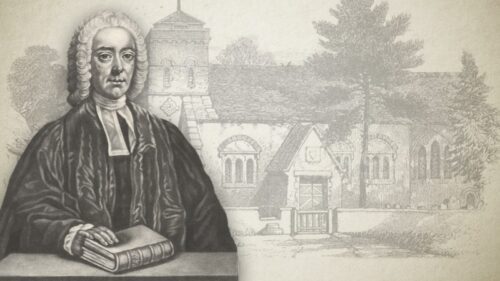
The Life And Death Of James Hervey
Gospel Standard 1870:
Last Days Of James Hervey
Author Of “Theron And Aspasia.”
To his doctor he wrote, at an early period of his last illness: “I now spend almost all my whole time in reading and praying over the whole Bible. Indeed, you cannot conceive how the springs of life in me are relaxed and relaxing. ‘What thou doest, do quickly,’ is a proper admonition for me as I approach dissolution. My dear friend, attend to the one thing needful. I have no heart to take any medicine; all but Christ is to me unprofitable. Blessed be God for pardon and salvation through his blood. Let me prescribe this for my dear friend. My cough is very troublesome; I can get little rest; but my never-failing remedy is the love of Christ.”
On the 15th of December, the month that he died, he spoke very strongly to his curate, Mr. Haddock, about the assurance of faith, and the great love of God in Christ. “Oh!” said he, “how much has Christ done for me, and how little have I done for so loving a Saviour! If I preached even once a week, it was but a burden to me. I have not visited the people of my parish as I ought to have done, and thus preached from house to house. [Hervey had a very weak and tender constitution; so that the greater part of his life was one continual struggle with disease; and he was thus much confined to the house, and prevented preaching and visiting his people as he would otherwise have done] I have not taken every opportunity of speaking for Christ. Do not think I am afraid to die. I assure you I am not. I know what my Saviour has done for me. I want to be gone. But I wonder and lament to think of the love of Christ in doing so much for me, and how little I have done for him.”
On the 25th of December, the day that he died, his loving friend and physician, Dr. Stonehouse, came to see him three hours before he expired. Hervey seized the opportunity, spoke strongly and affectionately to him about his soul’s concerns, and entreated him not to be overcharged with the cares of this life. Seeing his great weakness and prostration, the doctor begged him to spare himself. “No, doctor,” replied the dying man with ardour. ”No! You tell me I have but a few minutes to live; let me spend them in adoring our great Redeemer.” He then repeated the words: “Though my heart and my flesh fail, God is the strength of my heart and my portion for ever;” and also dwelt, in a delightful manner, on Paul’s words: “All things are yours; whether life, or death, or things present, or things to come.” “Here,” he exclaimed, “here is the treasury of a Christian! Death is reckoned among this inventory; and a noble treasure it is. How thankful I am for death, as it is the passage through which I go to the Lord and Giver of eternal life, and as it frees me from all the misery which you now see me endure, and which I am willing to endure as long as God thinks fit! I know that he will by-and-by, in his own good time, dismiss me from the body. These light afflictions are but for a moment, and then comes an eternal weight of glory. O! Welcome, welcome death! Thou mayst well be reckoned among the treasures of the Christian! To live is Christ, and to die is gain!”
After this he lay for a considerable time without seeming to breathe, and his friend thought he was gone; but he revived a little; and, being raised in his chair, said, “Lord, now lettest thou thy servant depart in peace, according to thy most holy and comfortable words; for mine eyes have seen thy most holy and comfortable salvation! Here, doctor, is my cordial. What are all the cordials given to support the dying, in comparison of that which arises from the promises of salvation by Christ? This, this supports me!”
He said little after this, and was rapidly drawing near his end. About three o’clock in the afternoon, he said: “The conflict is over, now all is done.” After that time he scarcely spoke anything intelligible, except the words, “Precious salvation!” At last, about four o’clock, without a sigh or a groan, he shut his eyes and departed, on Christmas-day, 1758, in the 45th year of his age.
[What a beautiful death-bed, and what a testimony to the blessed doctrine of the righteousness of Christ being imparted to us for justification, and of which Hervey was so firm a believer, and so zealous and powerful a champion. Joseph C. Philpot]James Hervey (1714-1758) was an Anglican (High-Calvinist) preacher and writer. In 1737, he took his orders and held several curacies throughout the course of his gospel labors. In 1752, he succeeded his father as rector of Weston Favell. His writings were used of God to help shape Robert Hawker’s understanding of sovereign grace. In “William Huntington: Pastor Of Providence”, 1994, George Ella wrote:
“Huntington realized early in his ministry that a too worldly, Romanist and rationalistic view of justification, sanctification and personal holiness was rampant in the churches. This was, in his opinion, because the biblical doctrine of imputed righteousness was either paid mere lip-service, robbed of its direct connection with the person of Christ, or denied altogether. Thus Huntington, who was familiar with Wesley's attacks on Hervey and suffered personally at the hands of the Fullerites, decided to take up Hervey's mantle and complete the work he had begun to do, stressing especially the part personal sanctification played in the lives of the elect. In his first prose work, The Arminian Skeleton, Huntington attacks both Armi- nianism and Fullerism by emphasizing the traditional tenets of Calvinism and stressing that only when these tenets are accepted can one begin to understand the biblical doctrines of imputed righteous- ness, sanctification and holiness."




